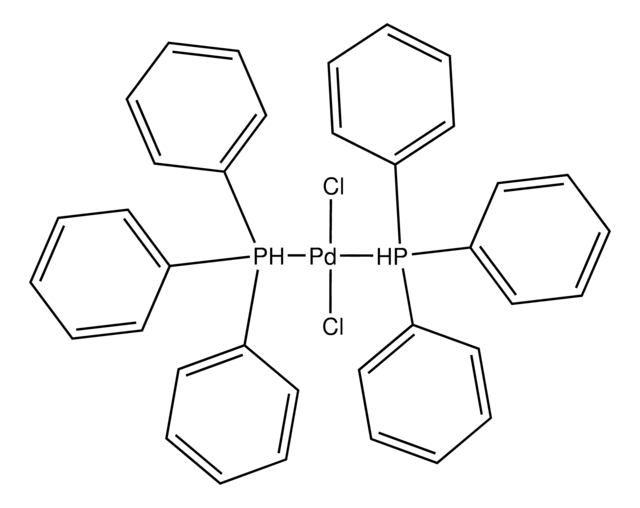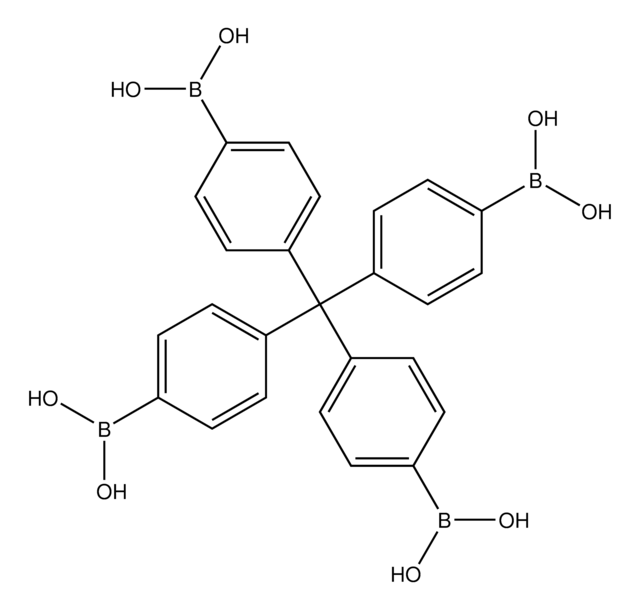417130
Benzene-1,4-diboronic acid
≥95.0%
Synonym(s):
p-Phenylenediboronic acid, 1,4-Phenylenebisboronic acid, 1,4-Phenylenediboronic acid, p-Benzenediboronic acid, Benzene-1,4-diboronic acid, NSC 25410
About This Item
Recommended Products
Quality Level
Assay
≥95.0%
form
powder
mp
>350 °C (lit.)
SMILES string
OB(O)c1ccc(cc1)B(O)O
InChI
1S/C6H8B2O4/c9-7(10)5-1-2-6(4-3-5)8(11)12/h1-4,9-12H
InChI key
BODYVHJTUHHINQ-UHFFFAOYSA-N
Looking for similar products? Visit Product Comparison Guide
Related Categories
Application
- Externally initiated Kumada catalyst-transfer polycondensation
- Suzuki-Miyaura cross-coupling reactions
- Energy transfer processes in optoelectronic devices
- Palladium-catalyzed sequential alkenylation and conjugate addition reactions
- Scholl cyclizations
Reagent used in Preparation of
- Crosslinkers and cross-linked core-shell nanoparticles by RAFT polymerization and palladium-catalyzed Suzuki coupling reaction
- Fluorescence and solution-processable coordination polymers
- Cyclotricatechylene based porous crystalline material for gas storage
- Indolizine derivatives as OLEDs
- Helically p-stacked thiophene-based copolymers with circularly polarized fluorescence
- Novel organic semiconductors and applications in organic thin-film transistors
- Highly twisted polycyclic aromatic hydrocarbons with unexptected reactivity
Other Notes
Signal Word
Warning
Hazard Statements
Precautionary Statements
Hazard Classifications
Acute Tox. 4 Oral
Storage Class Code
11 - Combustible Solids
WGK
WGK 3
Flash Point(F)
Not applicable
Flash Point(C)
Not applicable
Personal Protective Equipment
Certificates of Analysis (COA)
Search for Certificates of Analysis (COA) by entering the products Lot/Batch Number. Lot and Batch Numbers can be found on a product’s label following the words ‘Lot’ or ‘Batch’.
Already Own This Product?
Find documentation for the products that you have recently purchased in the Document Library.
Customers Also Viewed
Articles
Professor Aran discusses engineering graphene-based materials through careful functionalization, enabling diverse applications.
Professor Aran discusses engineering graphene-based materials through careful functionalization, enabling diverse applications.
Professor Aran discusses engineering graphene-based materials through careful functionalization, enabling diverse applications.
Professor Aran discusses engineering graphene-based materials through careful functionalization, enabling diverse applications.
Our team of scientists has experience in all areas of research including Life Science, Material Science, Chemical Synthesis, Chromatography, Analytical and many others.
Contact Technical Service










